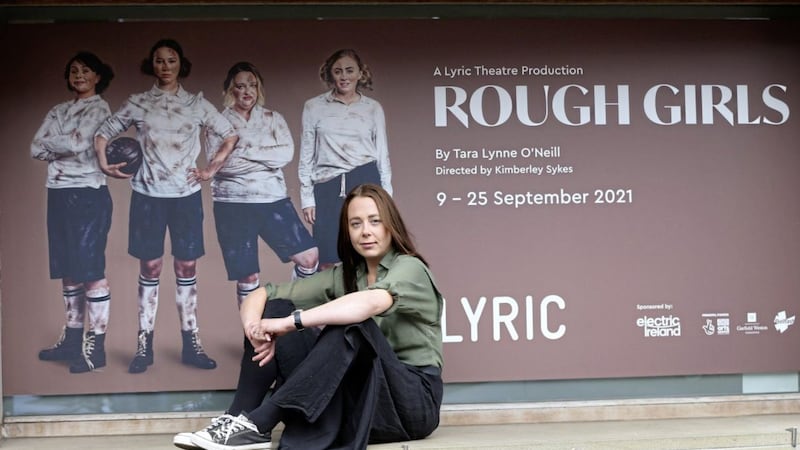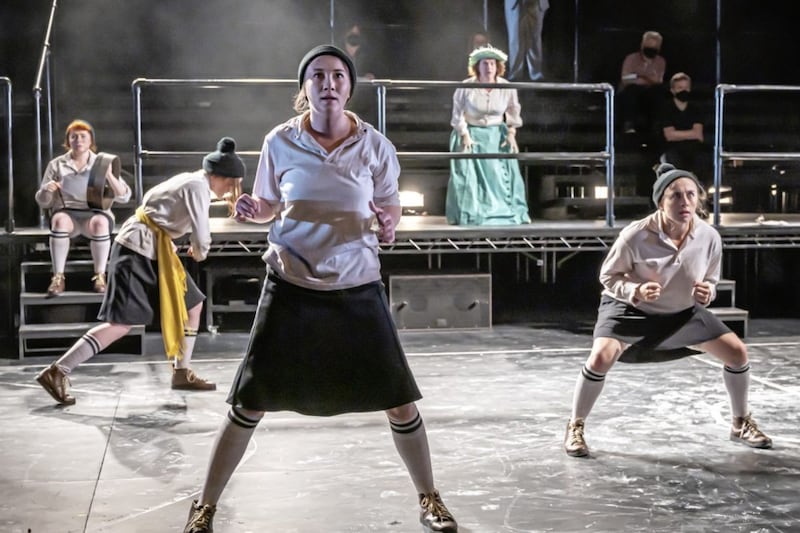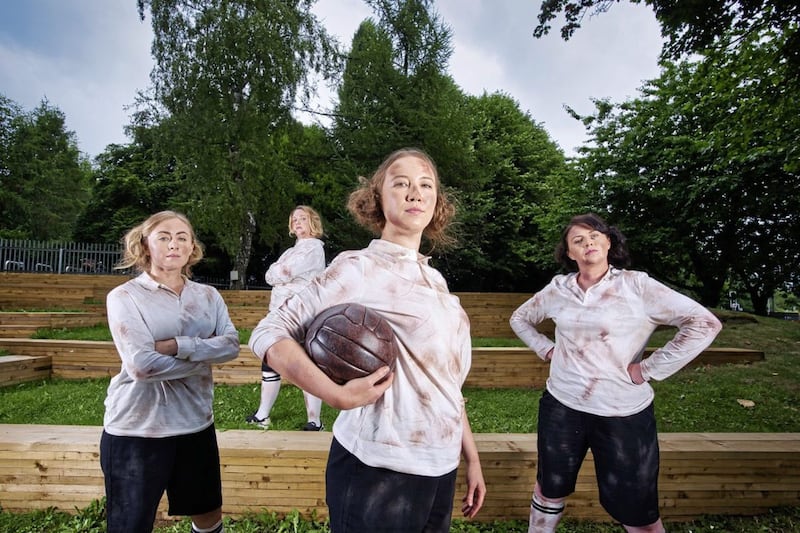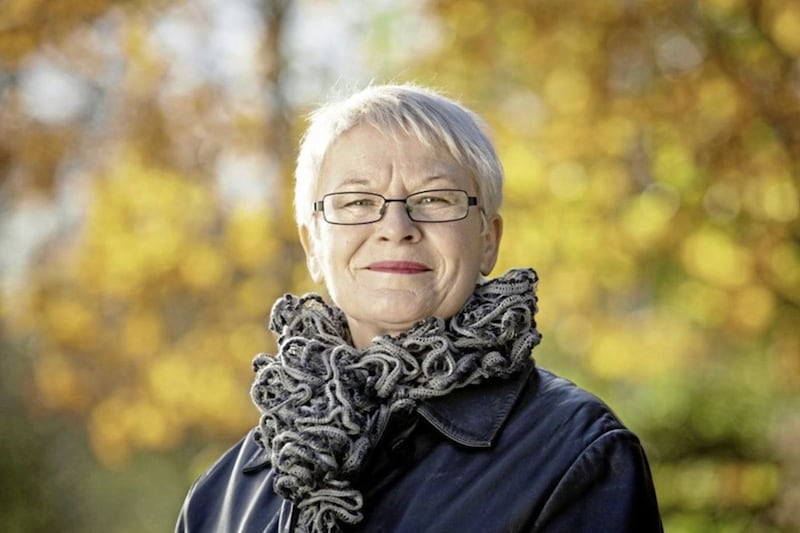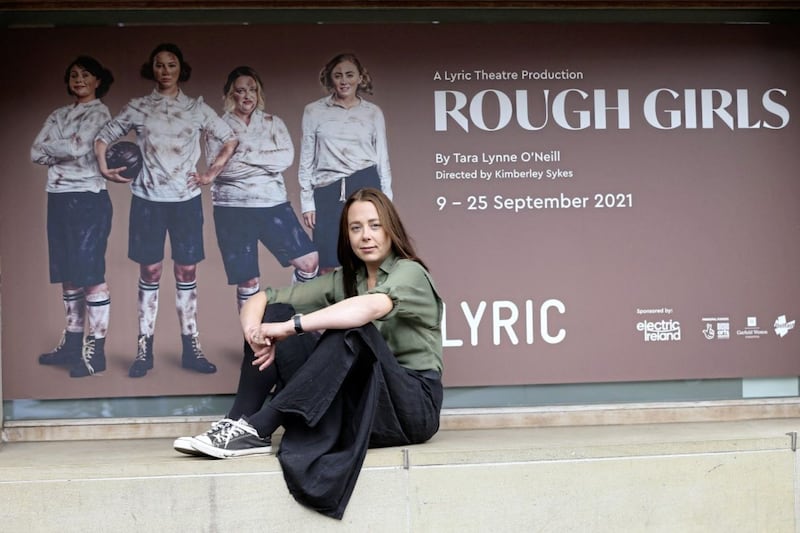IN English theatre director Kimberley Sykes's impressive CV, an entry, right up at the top under 'current work' catches the eye. It reads 'Rough Girls at the Lyric Theatre by Tara Lynne O'Neill', with 'Romeo and Juliet by William Shakespeare at London's Open Air Theatre' assigned to the space underneath.
It is almost worthy of a double-take; a billing that would doubtless be seized upon with hilarious results by O'Neill's quick-witted Derry Girls alter ego, Ma Mary.
The juxtaposition of the two names - the Belfast actress and writer with that of probably the greatest playwright that ever lived - seems bizarrely incongruous... but only at first.
Yet for Yorkshire-born Sykes, well known for her classical work with the Royal Shakespeare Company, National Theatre and the Royal Academy of Music, moving seamlessly from a Shakespearean romantic tragedy to the little-known story of Belfast's first female football team is not the seismic shift it might first appear.
"I try to make Shakespeare and classical work feel like new writing and, conversely, I try to bring a classical rigour and respect to new plays," explains Sykes who, when we spoke, had been in Belfast for three weeks of intense rehearsals for O'Neill's play about the formation of Northern Ireland's groundbreaking women's team more than 100 years ago.
"And Rough Girls has definitely the makings of a modern classic."
Set in Belfast between 1917 and 1921, Rough Girls is based on the true story of the Belfast women who stepped on to a pitch to kick their way through a male-dominated game – and society – while raising thousands of pounds for men returning from the First World War.
Chiming with the recent equality movements across the sports and cultural sectors, it features an 11-strong female cast and, importantly for Sykes, passes the theatrical Bechdel test with flying colours.
A tool to evaluate whether a piece of fiction or film portrays women in a way that is sexist or characterised by gender stereotyping, to pass the test - named after American cartoonist, Alison Bechdel - a work must feature at least two women who have names and who talk to each other about something - anything - other than a man.
Sykes, who is all for strong female leads - particularly in Shakespeare's plays, where female roles were traditionally played my males in the 16th century - sees Rough Girls as ticking all the appropriately 'woke' boxes, but more than that, it is a tale of working class women fighting to be heard together.
"We are used to seeing women as maybe princesses or extraordinary characters in a play, but to see ordinary women and to see 11 ordinary women - who are extraordinary within themselves... there is really something special in that," says the respected director who describes herself modestly as a "Yorkshire lass".
"I really hope that women, men, young girls and young boys come and see this production and gain a new-found understanding of women's experiences, or what it might feel like to break through societal 'norms' as a working class woman at the time.
"That is my own background and that is the case for so many women still, today, in this industry, who can feel they are swimming against the tide. I have been lucky and have been given so many opportunities as a freelance theatre director, but it was not an easy journey to get here."
She has enjoyed a long association with the Lyric, from working as associate director for A Midsummer Night's Dream – A Play for the Nation in 2014 with the RSC, to sitting on its 'New Playwright' scheme, and is delighted to be back in Belfast and working with O'Neill in particular, whom she fondly describes as "a powerhouse of Northern Irish theatre".
"I was well aware of Tara Lynne's work, but it was her love for storytelling and courage to leap into the unknown that really made me so interested in Rough Girls," says Sykes, who spent much of lockdown volunteering in a foodbank and subsequently creating the 'Beyond the Bank' community organisation to provide free online theatre workshops.
"The historical context is also intriguing. In 1921 the FA banned women's football and there was this sense of forcing women back into their domestic roles, after they had worked in the munitions factories during the War.
"A light is turned on and we see who these women really are and the lives they led off the pitch. Some are based on real women players at the time like Molly Seaton, who was probably the best well-known Northern Ireland footballer at the time, but this is very much a work of fiction – taking inspiration from these women and pushing it further."
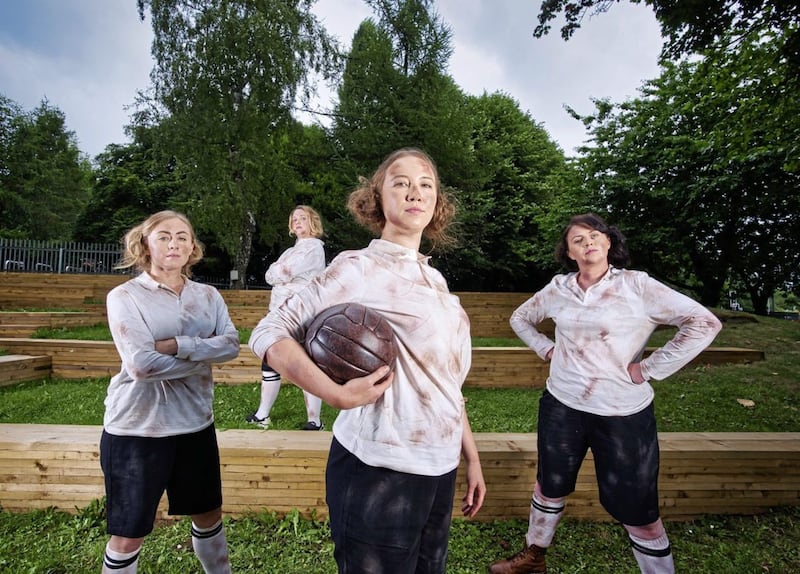
Pushing against the boundaries of theatre itself is also a mark of this large-scale production which uses puppetry to bring to life an "important male character" and live music from Katie Richardson to create the city's heartbeat and energise the women's singalong in the munitions factory.
Yet, what to do about the football action itself has been a conundrum, not least because "you're not necessarily in control of where that ball is going...". Audiences will just have to wait and see.
But the real breakthrough element in the play - which opens tomorrow - is the character of 'She' who brazenly crashes through theatre's invisible 'fourth wall' and is played by O'Neill herself.
"'She' exists in a slightly different world in that she is of 'now', but she is also timeless," teases Sykes who describes the role as "like a narrator, a master of ceremonies, a ringmaster, a witness, an observer, a facilitator" who guides the audience through the story.
"She is a bit of a magician who exists in the world of the theatre – she can change the lights, she can come in and out of character and she can see the audience, talk to them, have banter with them," Sykes enthuses.
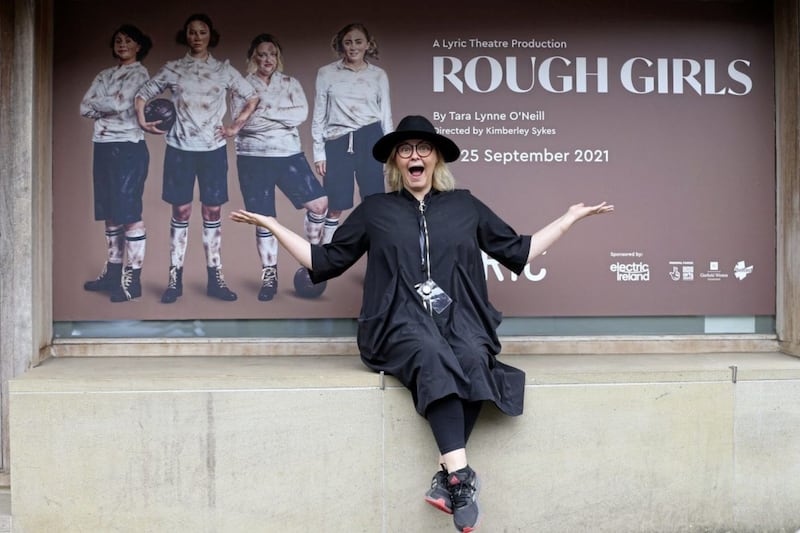
"I think it brings the play bang up to date and stops it from feeling like a period piece.
"It also becomes theatrically surprising because people will never quite know what 'She' is going to do next. I think, for many, many years – and Tara Lynn says this at the start of the play – women in theatre are used to playing supporting characters, someone who is there in relation to another man, rather than a person in their own right.
"We are always aligned to boundaries or put in boxes. 'She' doesn't live in a box. She is boundless, she can be and go and do anything or anywhere she likes - and that is a key message in the play."
Will the story of a women's football team from the 1920s still resonate with 'girl power' today?
"Absolutely," affirms the boundary-breaking director before rushing back to the stage to continue rehearsals. "Women's football was banned for 50 years by the FA and even today it is difficult to find professional female footballers who are paid properly.
"In Rough Girls, we look back and meet these trailblazers. A lot of us wouldn't be here without them and perhaps this extraordinary Northern Ireland women's football team who have just qualified for the Euros might not be where they are either without these incredible women in the early 20th century who paved the way."
Rough Girls, supported by Electric Ireland, runs at the Lyric Theatre from tomorrow until September 25.
